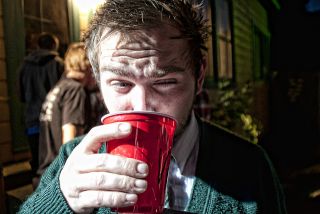Addiction
College Binge Drinking for Social Satisfaction
Study shows binge drinking associated with more socially powerful students
Posted August 13, 2014

Image: Flickr/KyleSullivan cc license
Binge drinking is defined as consuming at least four drinks for women and five drinks for men in a single drinking session, at least once every 14 days on average. New research suggests that binge drinking at college is associated with high status and these drinkers are happier with their college social experience than their non-binge drinking peers.
According to the study, students from higher status groups (i.e., wealthy, male, heterosexual and white) were consistently happier with their college social experience than their peers from lower status groups (i.e., less wealthy, female, Lesbian/Gay/Bisexual/Transgender/Questioning (LGBTQ) and non-white). In addition, students from higher status groups were more likely than their peers from lower status groups to binge drink.
Carolyn L. Hsu, co-author of the study and an associate professor of sociology at Colgate University said,
“Students, who are considered more socially powerful, drink more. Binge drinking then becomes associated with high status and the ‘cool’ students on campus. It is a symbolic proxy for high status in college and it is what the most powerful, wealthy, and happy students on campus do. Among all groups, we found that binge drinking and social satisfaction were strongly connected.”
The study relied on a survey of nearly 1,600 undergraduates attending a selective Northeastern residential liberal arts college in 2009.
Researchers found that across race, socioeconomic status, gender and sexuality, the connection between binge drinking and satisfaction with the college social experience, remained consistent. The students in all groups consistently liked college more when they joined other students in the binge drinking culture, feeling that it was the most socially acceptable thing to do. The desire to be part of the “in” crowd often contributed to binge drinking even when many personally preferred not to. Many students saw binge drinking as a logical means to adapt, survive, and seek out the most favorable life while in college.
Very interestingly, the survey data did not indicate that unhappy students were binge drinking to self-medicate. Instead, the students with the most stress, anxiety, and experiences with discrimination or sexual abuse, were the least likely to drink.
“It’s the kids who say everything is great who drink the most. Low status students in particular seem to be using binge drinking as a vehicle for social mobility and as a way to contend with an otherwise hostile social environment,” Hsu said.
According to the Centers for Disease Control and Prevention, about 90% of the alcohol consumed by youth under the age of 21 in the United States is in the form of binge drinking.
What can colleges do? Clearly, there is an issue with campus culture if the best means to popularity and sociability is by binge drinking. Engaging students in the discussion about cultural change is probably a great place to start.
***
Constance Scharff is the Senior Addiction Research Fellow and Director of Addiction Research for Cliffside Malibu. She is also the coauthor of the Amazon.com bestselling book Ending Addiction for Good with Richard Taite.


